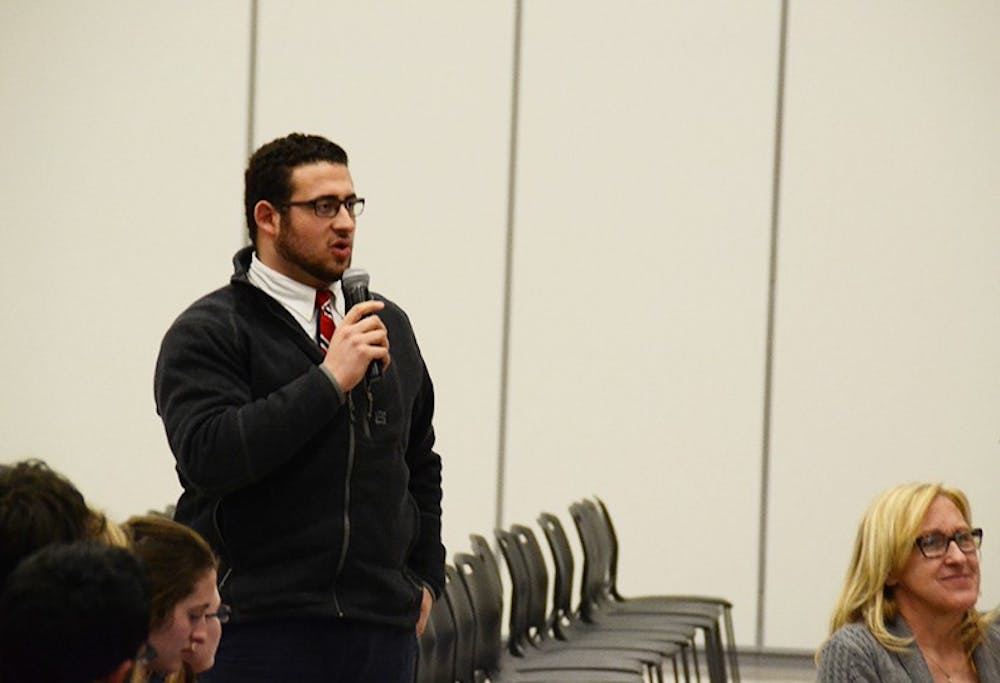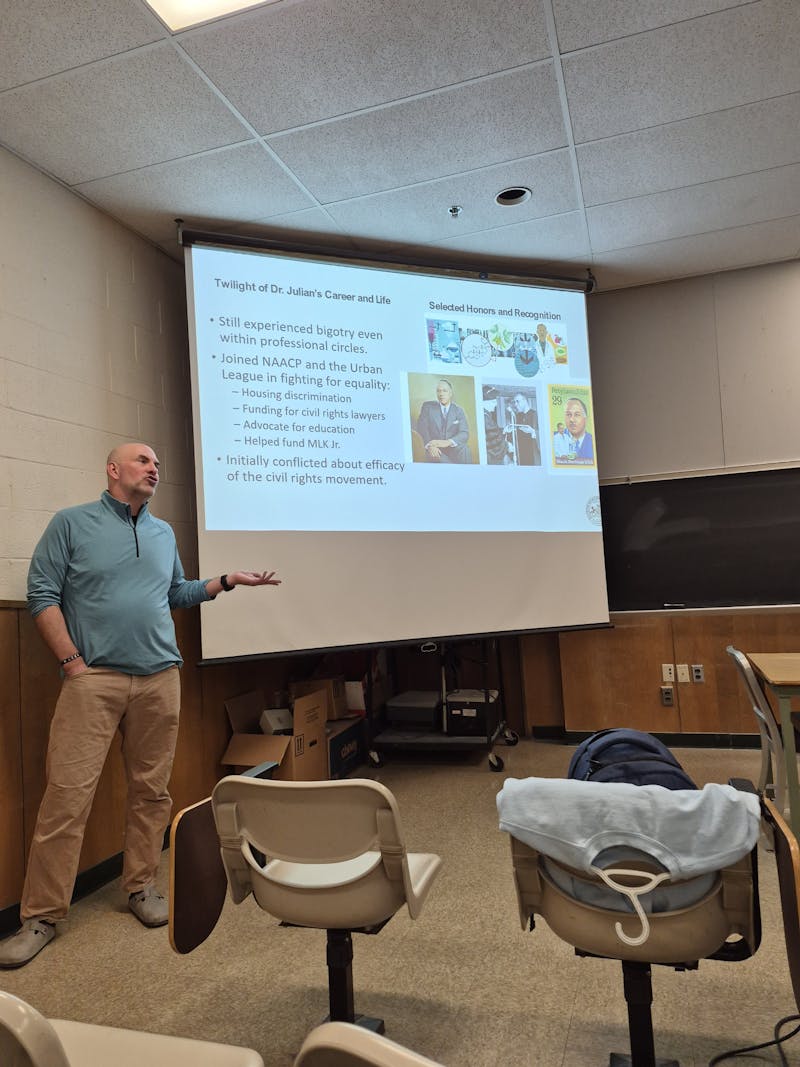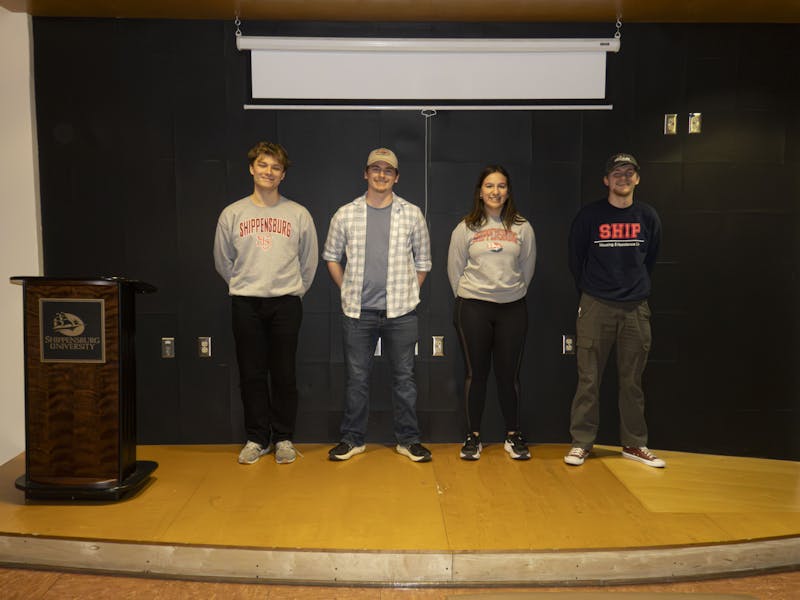Hands shot into the air at the town hall meeting Tuesday night, following the trajectory that tuition prices at Shippensburg University may be heading — up.
A panel of SU administrators presented the ins and outs of the new pilot tuition program to a crowd of students and faculty in the Ceddia Union Building (CUB) multipurpose room.
Under the proposed plan, which was passed by the SU Council of Trustees on Jan. 30, undergraduate Pennsylvania resident students would be paying per credit for tuition next fall, instead of paying a flat rate for 12–18 credits like they have in the past.
If the plan is passed by the Pennsylvania State System of Higher Education (PASSHE) Board of Governors, students taking 12 credits would be paying less, while those taking more than 12 credits would be paying more.
The average SU student takes 14.2 credits a semester, said Bill Sommers, associate vice president of enrollment management.
Under the new plan, students taking 14 credits would pay $286 more per semester. Students taking 15 credits would pay $550 more per semester.
To help alleviate the additional cost to students, the university plans to provide $1.5 million in institutional grant aid to students who can demonstrate financial need.
For some students, this may not be enough.
Junior Ashley Jerome takes at least six classes a semester for her major in early childhood education and dual certification in special education. She also works three jobs to help pay for her college education.
“Basically the only answers we got were, here’s your tuition plan,” Jerome said.
The panel consisted of Sommers; Barbara Lyman, provost and senior vice president of academic affairs; Rick Ruth, vice president of technology and library services; and Mindy Fawks, associate vice president of administration and finance.
“Students are understandably concerned about how they would be able to meet the extra cost,” Lyman said.
When PASSHE was founded in 1983, the Commonwealth of Pennsylvania funded three out of every four of the institution’s budget dollars, Lyman said. Today, the state funds one out of every four dollars.
“The model has been flipped,” Lyman said.
In the past decade, SU cut $34.5 million from the budget to help offset costs, Sommers said.
Some of these budget cuts include reducing overtime, equipment purchases, funding for building improvements and professional development and travel. SU also cut utility expenses by $465,000 in four years through green energy initiatives.
Budget cuts were also made by holding staff and administrative positions vacant.
As faculty have retired from tenure-track positions over the years, administration has tried to leave those positions open in order to save money, according to the panel.
At this point, there is nowhere else to cut, panel members said.
“There has not been another idea that would generate funds that would generate the level of funds needed in a timely fashion to forestall some more difficult alternatives,” Lyman said.
During the meeting, students proposed making cuts to various areas on campus, like in activities. One student suggested making the activity and recreation fees optional for those students who do not use them.
Another student stood up and pointedly recited the names of SU administrators and their salaries, including Lyman’s.
Lyman closed her eyes, pursed her lips and did not respond.
The student, Dominic Giovanniello, a student senator, said, “In general, you can’t look at a situation like this and stand on the sidelines.”
Giovanniello was unsatisfied with the responses of the panel. “The bottom line is that the administration beats around the bush when they answer these questions. We experience it in senate meetings,” he said.
Several students asked what other options were explored before deciding on the per credit program.
Justin Schneider, the student senator for the John L. Grove College of Business, accused the panel of avoiding direct answers to questions at the town hall meeting.
“The fact that you’re circumnavigating our answers is plain not respectful,” Schneider said. “You’re here for a reason, you get paid for a reason.”
Students asked the panel what could be done to stop the per credit program from being implemented at SU. Since the decision has already been passed at SU, the next move will be made by the Board of Governors.
If the per credit tuition program is approved for SU it will be under a three year pilot. The program will be assessed after three years to determine whether it should be modified, stay in place or be removed entirely.
The Board of Governors will be meeting April 8 and 9 to discuss the pilot program for SU.





The Slate welcomes thoughtful discussion on all of our stories, but please keep comments civil and on-topic. Read our full guidelines here.